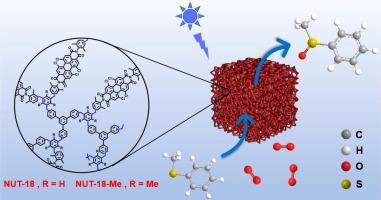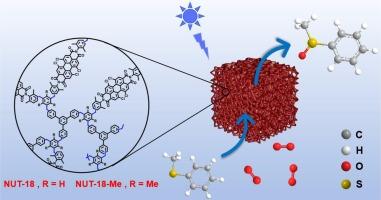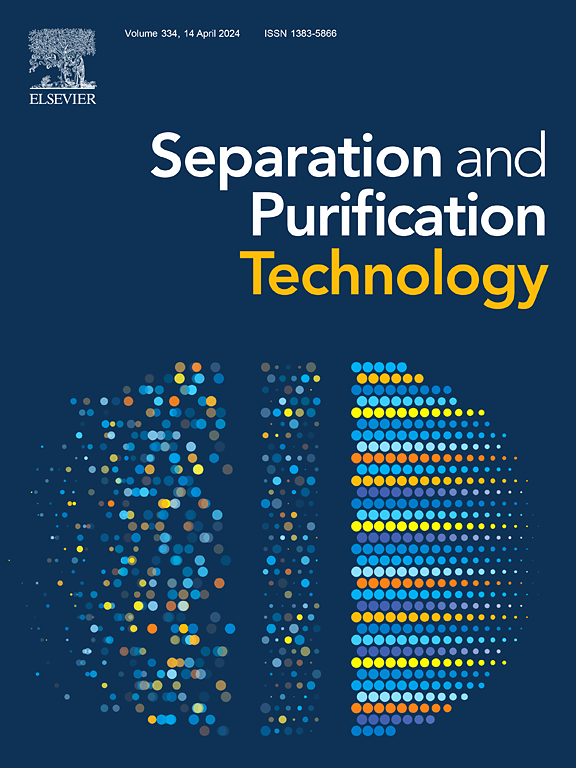Perylene diimide-based hyper-cross-linked polymers for visible-light-driven selective organic sulfide oxidation
IF 8.1
1区 工程技术
Q1 ENGINEERING, CHEMICAL
引用次数: 0
Abstract
Hyper-cross-linked polymers (HCPs) feature excellent pore structures, ultra-high stability, and ease of preparation, making them promising candidates for visible-light-driven selective organic sulfide oxidation. Developing new HCPs of good performance is of great significance in the endeavor. Perylene diimide (PDI) exhibits excellent visible light absorption properties due to its high planar conjugated structure, showing potential as a monomer for photocatalytic HCP synthesis. In this study, we report the construction of two HCPs, named NUT-18 and NUT-18-Me, employing the Friedel-Crafts alkylation reaction using PDI derivatives as monomers. Both HCPs possess high specific surface area (reaching up to 811 and 828 m2/g) and photoactivity. Consequently, NUT-18 and NUT-18-Me demonstrated photocatalytic efficiency, with conversion and selectivity exceeding 98 % in the various organic sulfides’ photocatalytic oxidation. Notably, the photocatalytic performance is well-maintained even after 5 cycles, indicating good recyclability. Investigation of the catalytic mechanisms revealed that the selective catalytic oxidation of sulfides is based on the synergistic promotion of dual pathways for electron and energy transfer. This research highlights the potential of PDI molecules in designing and synthesizing porous materials as promising photocatalysts.


用于可见光驱动的选择性有机硫化物氧化的二亚胺基过交联聚合物
超交联聚合物(HCP)具有优异的孔隙结构、超高的稳定性和易于制备的特点,是可见光驱动的选择性有机硫化物氧化的理想候选材料。开发新的高性能 HCP 对这项工作具有重要意义。过二亚胺(PDI)因其高平面共轭结构而具有优异的可见光吸收特性,显示出作为光催化 HCP 合成单体的潜力。在本研究中,我们以 PDI 衍生物为单体,通过弗里德尔-卡夫斯烷基化反应构建了两种 HCP,分别命名为 NUT-18 和 NUT-18-Me。这两种 HCP 都具有很高的比表面积(分别达到 811 和 828 m2/g)和光活性。因此,NUT-18 和 NUT-18-Me 具有很高的光催化效率,在各种有机硫化物的光催化氧化中,其转化率和选择性均超过 98%。值得注意的是,NUT-18 和 NUT-18-Me 在光催化氧化各种有机硫化物的过程中,转化率和选择性均超过 98%。对催化机理的研究表明,硫化物的选择性催化氧化是基于电子和能量转移双途径的协同促进。这项研究凸显了 PDI 分子在设计和合成多孔材料作为前景广阔的光催化剂方面的潜力。
本文章由计算机程序翻译,如有差异,请以英文原文为准。
求助全文
约1分钟内获得全文
求助全文
来源期刊

Separation and Purification Technology
工程技术-工程:化工
CiteScore
14.00
自引率
12.80%
发文量
2347
审稿时长
43 days
期刊介绍:
Separation and Purification Technology is a premier journal committed to sharing innovative methods for separation and purification in chemical and environmental engineering, encompassing both homogeneous solutions and heterogeneous mixtures. Our scope includes the separation and/or purification of liquids, vapors, and gases, as well as carbon capture and separation techniques. However, it's important to note that methods solely intended for analytical purposes are not within the scope of the journal. Additionally, disciplines such as soil science, polymer science, and metallurgy fall outside the purview of Separation and Purification Technology. Join us in advancing the field of separation and purification methods for sustainable solutions in chemical and environmental engineering.
 求助内容:
求助内容: 应助结果提醒方式:
应助结果提醒方式:


